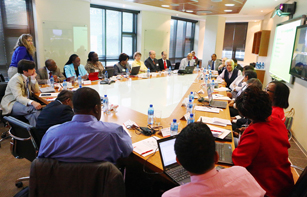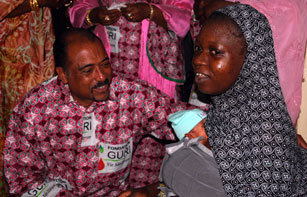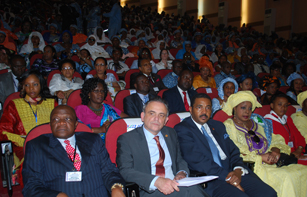
A general view of the panel during the Symposium held at the University of KwaZulu Natal School of Medicine in Durban, South Africa. Credit: UNAIDS/A.Debiky
When doctors from the University of Mississippi medical centre announced on 2 March 2013 that a baby had been ‘functionally cured’ of HIV, the world hailed the news as a historical medical breakthrough.
The baby—famously known as the ‘Mississippi baby’—was born with HIV and treated with aggressive antiretroviral drugs 30 hours after birth. Now, more than two years old, doctors confirm that the baby has not taken any medication since the age of 18 months and tests show no sign of re-active HIV (detectable viral load).
From the time that this extraordinary news was announced scientists and researchers have been busy trying to understand how the ‘Mississippi baby’ case could advance future research in preventing mother-to-child transmission of HIV.
More than 20 scientists, researchers, public health practitioners, donors, government authorities, representatives of non-government organisations and civil society came together for a two-day symposium on 3-4 June under the theme Scientific advances from ‘Mississippi baby’: Implications for public health programmes on mother-to-child transmission of HIV.
“This meeting is about giving people hope,” said UNAIDS Executive Director, Michel Sidibé. “The Mississippi miracle has to become a Durban miracle, a Bamako miracle, a miracle for all children irrespective of where they are born.”
Organised by UNAIDS and the Centre for the AIDS Programme of Research in South Africa (CAPRISA), the symposium focused on 1) whether programmes to stop new HIV infections among children need to be reformulated to promote early identification and treatment of babies at risk of HIV infection and 2) challenges associated with stopping new HIV infections among children and paediatric antiretroviral treatment.
Despite the 24% drop in new HIV infections in children since 2009, some 330 000 children around the globe were born with HIV in 2011. Most children born with HIV (more than 90%) are in sub-Saharan Africa.
Many African countries have made remarkable progress in preventing mother-to-child transmission of HIV by increasing access and integrating HIV prevention, treatment and cares services to mothers and their new-borns. AIDS-related deaths among children in the 22* priority countries of the Global Plan towards the Elimination of New HIV Infections among Children by 2015 and Keeping their Mothers Alive also reduced from 243 000 in 2009 to 203 000 in 2011
This meeting is about giving people hope. The Mississippi miracle has to become a Durban miracle, a Bamako miracle, a miracle for all children irrespective of where they are born.
UNAIDS Executive Director Michel Sidibé
However, progress in expanding access of antiretroviral therapy to children has been minimal. The percentage of children living with HIV eligible for treatment and who were receiving it in 2011 largely falls below 50% in at least 15 of the 22 priority countries—8% in Chad, 19% in Ethiopia and 29% in Malawi.
“Paediatric treatment and care lags behind; there seems to be a disconnect between investments in programmes to stop new HIV infections in children and for children in need of treatment. Even when the infants are identified they are not successfully linked to care,” said Dr Chewe Luo, UNICEF Senior Advisor on AIDS.
The ‘Mississippi baby’ case was discussed at great length highlighting the need for early infant diagnosis and initiation of treatment. “The relevance of the ‘Mississippi baby’ to the general population remains unclear and more research, including for safe and appropriate neonatal drugs needs to be done before we push for widespread change in policy,” said Dr Hanna Gay, Associate Professor at University of Mississippi, who treated the ‘Mississippi baby’. “But one thing we can be certain of is that early diagnosis and treatment saves lives.”
At the end of the two-day discussions, participants made several recommendations, including the need for early infant diagnosis, better research and improved medicines for children as well as more efficient funding mechanisms to strengthen mother and child AIDS programmes.
“What we do know is that early diagnosis of HIV and early treatment of infants and children does lead to better outcomes – regardless of the issue of a cure. We should be concerned that we are not diagnosing and treating children early enough. In South Africa only 65% of children who are in need to treatment are on treatment,” said Dr Aaron Motsoaledi, Minister of Health of South Africa.















